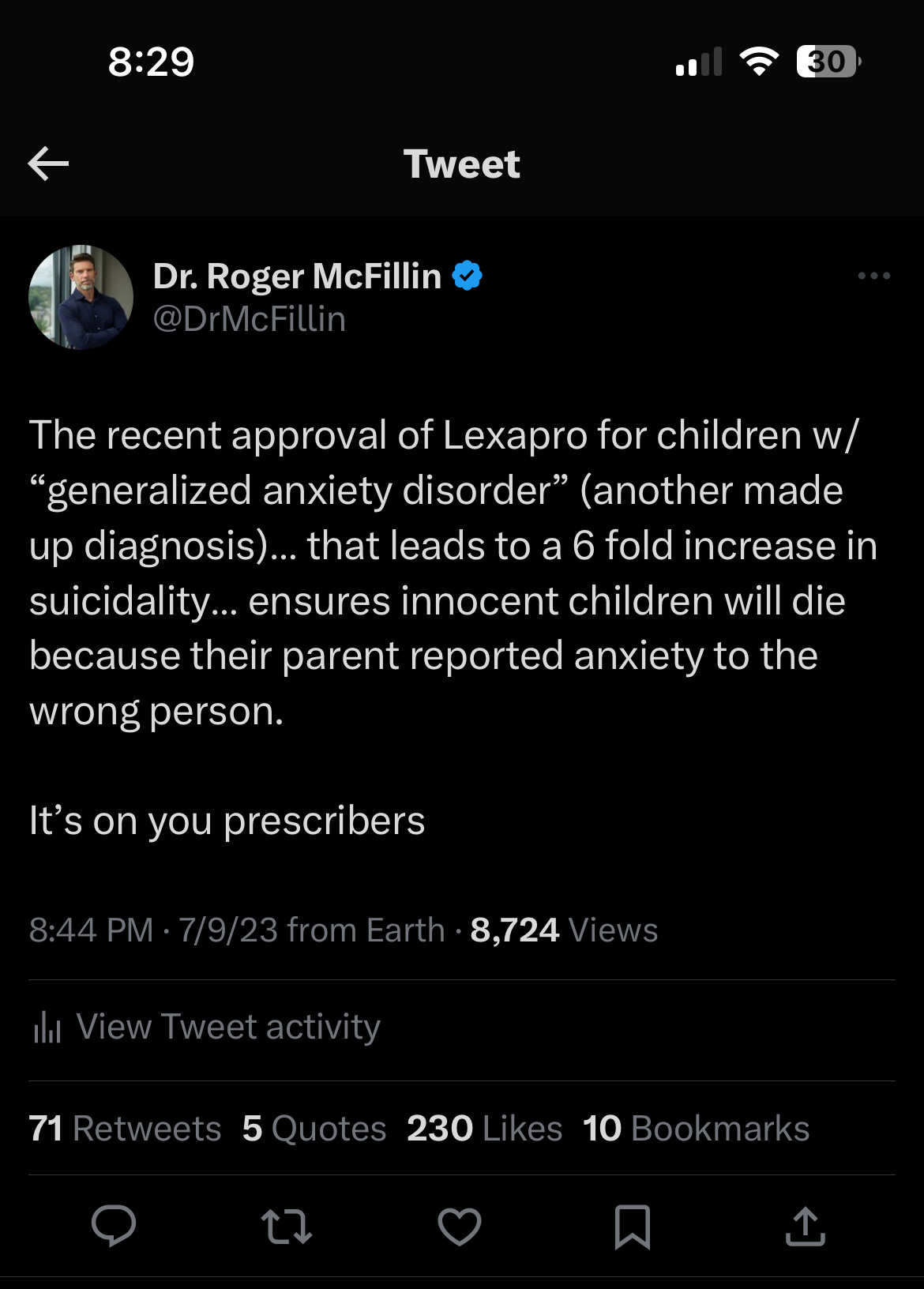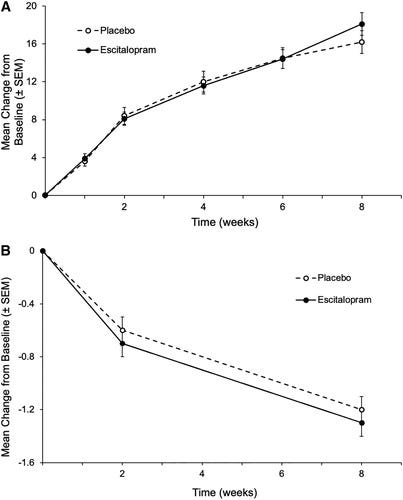The Dangerous Drugging of Child Anxiety
FDA Approval Does not Indicate Safety or Effectiveness
It’s a difficult week as the FDA determined Escitalopram (Lexapro) was safe for children as young as age 7 presenting with an anxiety disorder.
Astonishingly, 9.5% of the kids who took the medication became suicidal, while only 1.5% of those in the placebo group experienced suicidality. Inexplicably, the conclusion drawn from this study boldly claims that "Lexapro is well tolerated in pediatric patients with Generalized Anxiety Disorder." Yes, you read that right—a disturbing six-fold increase in suicidality.
According to Martin Pröderl, a clinical psychologist and researcher at the Department of Suicide Prevention, University Clinic of Psychiatry and Psychotherapy, Christian - Doppler - Klinik, Salzburg, Austria
“Children and adolescents exposed to escitalopram (Lexapro) were more likely to become suicidal than to experience an improvement in anxiety. These results are concerning and the conclusions in the article can be considered classic spin.”
Well Tolerated?
This is the study our FDA used to determine Escitalopram (Lexapro) was safe for children.
If you were aware of this statistic, would you still consider administering this drug to your child or a loved one? Would you consider this to be well-tolerated? It's the equivalent of playing Russian Roulette with a developing brain.
The harsh reality is that the majority, if not all, of the parents who grant consent for their child to take this drug will remain oblivious to this significant risk. Welcome to the drug approval process in the United States.
How Lexapro Was Approved
How do pharmaceutical companies assess the effectiveness of a drug? In the case of this particular drug, the study compared it to a placebo over an 8-week period, with the primary goal of measuring a reduction in anxiety. The researchers aimed to identify a "statistical difference between the two groups" to determine efficacy.
Previously, Lexapro had obtained approval for treating teenagers experiencing depressed mood. The pharmaceutical manufacturer is obligated to conduct and provide the FDA with two favorable studies, which they themselves develop, oversee, and report conclusions on. One might question whether this setup amounts to "the fox guarding the henhouse." Indeed, it raises concerns, as the number of unsuccessful drug trials becomes irrelevant, with only two positive results being the threshold for approval.
However, without delving too deeply into the intricacies of research methodology, statistics and clinical significance, it becomes evident that the placebo group demonstrated improvements across all primary and secondary measures during the 8-week period.
In the RCT, Strawn et al. (2023) concluded that “Escitalopram reduced anxiety symptoms and was well tolerated”. But this conclusion is not supported by the data presented. None of the 6 secondary outcomes is statistically significant and the drug-placebo differences are small and even close to zero for the three measures for remission. This raises doubt about clinical significance of the therapeutic effects. Strikingly, the findings for suicidal ideation were not discussed at all.
From an ethical, moral, and critical scientific standpoint, it is inconceivable to conclude that these drugs are safe or "tolerable".
Take a look at the secondary outcomes below: mean change from baseline to week 8 in CGAS and CGI-S scores. (A) Mean changes in CGAS score were similar for escitalopram and placebo through week 6 and numerically, but not statistically, greater for escitalopram at week 8. (B) CGI-S scores were numerically greater for escitalopram versus placebo at weeks 2 and 8, but differences were not statistically significant. CGAS, Children's Global Assessment Scale; CGI-S, Clinical Global Impression of Severity; SEM, standard error of the mean.
Anxiety is Normal
Anxiety, a natural response of our bodies to real or perceived stress, demands our attention. It is essential to recognize that children, just like adults, can experience anxiety as a result of genuine stressors in their lives. Anxiety serves as an innate mechanism, keeping them vigilant and safeguarding them from potential danger.
However, anxiety can also stem from the complex workings of the mind, generating threatening scenarios that may lack a tangible basis in reality. Moreover, children can experience anxiety as a response to witnessing a parent or family member grappling with their own fears, which can influence them to adopt a cautious mindset. This modeling process holds significant importance, as children observe and internalize their parents' behaviors, thereby shaping their own perspectives. In the mental health field, a common phrase used is "anxious parents, anxious kids," highlighting the interconnectedness between parental anxiety and its potential impact on children.
Anxiety itself is not inherently problematic; it serves as a normal and functional response to various stimuli. Our bodies are functioning as they should when anxiety arises. However, the crucial aspect lies in how children respond to anxiety and how they engage with their fears. This is where potential challenges may arise.
If a child's response to anxiety involves fixating on imagined threats originating within their own mind, and their natural disposition leads them to avoid situations that intensify their anxiety, they may inadvertently miss out on crucial learning experiences necessary for effectively managing fear. When children perceive the world as more dangerous than it truly is, their avoidance of feared situations can further exacerbate their anxiety. Effective behavioral treatments would have children learn to face feared situations to facilitate new learning.
Recognizing these patterns and providing support for children to develop healthy coping strategies becomes paramount. This support enables them to navigate anxiety in a manner that fosters growth, resilience, and a realistic understanding of the world around them. By nurturing these skills, children can gradually overcome excessive avoidance and cultivate a new relationship with fear that empowers them.
Anxiety is Not a Symptom to Drug
When we convey to children that anxiety is something to be eradicated, we inadvertently send the message that experiencing fear is inherently perilous. It implies that the only way to move forward in life is to suppress or find ways to escape from this emotion. Unfortunately, this mindset has given rise to a generation of young individuals who declare, "I have anxiety," as if it is an incapacitating disease rather than a natural human response. Consequently, many across the Western world are turning to medication to alleviate symptoms, which in turn hinders their ability to navigate normal developmental challenges.
Individuals who acquire the belief that emotions are inherently perilous are at a higher risk of developing substance abuse issues later in life, as they may resort to substances as a coping mechanism for their anxiety. This coping strategy can result in a lifelong struggle with their internal emotional experiences, leading to the formation of deep-seated beliefs that they are incapable of effectively managing the wide range of emotions that life inevitably entails.
The primary catalyst behind panic attacks is the fear of fear itself. The bodily sensations associated with anxiety are interpreted as threats, triggering the body's stress response and pushing it into a fight-or-flight state. Even in the absence of any clear or immediate danger, the mere presence of these sensations becomes perceived as dangerous in and of itself.
It is quite predictable that if a child resorts to using drugs to alter their emotions, they are more likely to continue this pattern into adulthood.
One of the most detrimental concepts we could impart to a child is the belief that their emotions are inherently wrong, excessively intense, or dangerous, necessitating the use of drugs to be considered acceptable. It is truly incomprehensible to me that this mindset has become prevalent in modern Western societies. Let there be no mistake: medicating childhood anxiety is a harmful approach.
FDA & Medical Practice
The prevailing belief among medical professionals that a drug, once FDA-approved, is inherently safe and effective has become the norm. It is my sincere hope that this article dispels this dangerous myth. Regrettably, our federal government fails to adequately protect us from hazardous medical interventions. What's even more distressing is that medical professionals often unquestioningly adhere to established guidelines based on studies similar to the one described here.
This serves as yet another example of how academics with ties to the pharmaceutical industry can manipulate trial data and draw conclusions that do not align with the actual scientific facts. When it comes to the health and well-being of children, the gravity of this situation is further magnified. If, like me, you once believed that such occurrences couldn't transpire in the United States of America, I hope this serves as a wake-up call.
P.S. A heartfelt thank you to all my subscribers! While I offer all my articles for free, your support through donations would be greatly appreciated. Your generosity helps me continue delivering valuable content. Thank you for being a part of this incredible community! If you are interested in more thought provoking conversations please subscribe and download the Radically Genuine Podcast with Dr. Roger McFillin.








Yikes. I took Lexapro years ago as a mature adult for clinical depression. It worked okay for me but not great. When my insurance switched me to the generic version, I had to stop taking it because I felt like running over random people with my car. I can’t imagine teenagers or children taking this stuff.
It actually seems like more of a hassle to keep your kid drugged consistently than if parents just taught them that their feelings are normal and there are ways to cope. But, you know, that would actually require parents to be involved in their children's lives, and that's just too hard!